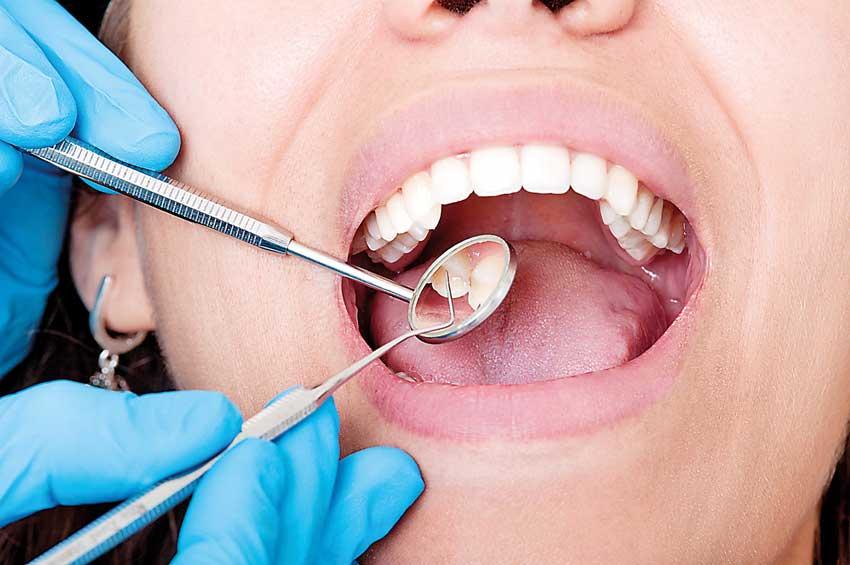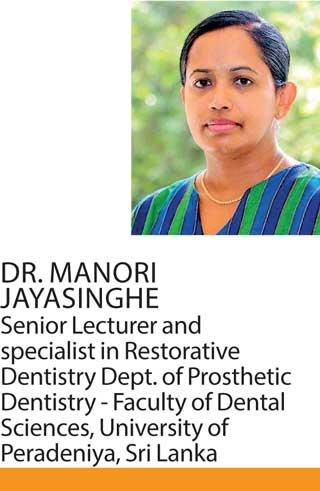01 Apr 2022 - {{hitsCtrl.values.hits}}

 “A genuine smile comes from the heart, but a healthy smile comes from a place that is free of microbial growth and cavities”
“A genuine smile comes from the heart, but a healthy smile comes from a place that is free of microbial growth and cavities”
Focusing on a healthy body care and physical appearance is something we always do, but how about giving a thought on better dental hygiene too?
World Oral Health day commemorated on March 20 every year reminds us the importance of maintaining good oral hygiene and ways in which we can maintain oral health in perfect condition. This year we celebrate on the theme of ‘Be proud of your mouth for your happiness and well-being” says Dr. Manori Jayasinghe, Senior Lecturer and specialist in Restorative Dentistry Dept. of Prosthetic Dentistry - Faculty of Dental Sciences, University of Peradeniya, Sri Lanka.
Structure of oral cavity
Oral cavity consists of teeth, mucosa combined with saliva which supports in maintaining teeth and mucosa from mechanical, microbiological, and chemical disturbances. However, we all cannot enjoy the happiness of having a healthy mouth. Dental caries, periodontal diseases, oral cancer and related conditions and malocclusion are considered common oral diseases.
Conditions disrupting good oral health
Dental caries
Dental Caries remains a significant public health problem in the country. It is considered the most common cause of toothache and hospital admissions in young children. Therefore, dental caries significantly reduces the health-related quality of life of a person. National oral health report in Sri Lanka in 2018 reveals that 63% of 5/6 years old, 41% of 15 years old, 92.5% of 35-44 years and 98% of 65-74 years are affected by dental caries which shows the burden to the economy of the country. Further, 47% of 12 years old and 70% of 35-74 years are affected by periodontal diseases. Percentage of people with tooth loss is above 80% for adults in the country.
The average percentage of people who use fluoridated tooth paste is ranged from 59% (age group of 64-75 years) to 82.1% (age group of 15 years). Different fluoride applications on teeth and fissure sealants are advised by the dental surgeons. Periodontal diseases can be minimized by maintaining regular tooth brushing by the individual supplemented with professional cleaning.
Oral cancer is the second most common cancer among Sri Lankan population and the leading cancer among males
Oral cancer
This is the second most common cancer among Sri Lankan population and the leading cancer among males. Nearly 2000 new oral cancer cases were detected in the year 2011. Every day around six new oral cancer cases are being detected and three oral cancer related deaths occur.
“The common risk factors for oral cancer are use of tobacco (smoking & smokeless), Areca nut and consumption of alcohol. Whole country should pay more attention to reduce the health and economic burden by this deadly disease” explains Dr. Jayasinghe.
However, 14% of 12-year-old have never visited a dental clinic as per the oral health report”
Reduction of dental caries is supported by reduction of frequency and amount of sugar and sugar rich food combined with use of fluoride tooth paste.
All individuals are advised to attend regular dental checkup in every six months and depending on the dental status, the dental surgeon might prescribe more frequent visits.
Dental clinics are freely available across the country
According to the national figure, 1 dental surgeon is available for 13,650 individuals. Accessibility to a government dental clinic has increased in the country. According to 2015-2016 data averagely around 65% people in all age groups have access to a government dental clinic within 5 km. Further, private dental clinics are also scattered throughout the country”, states Dr. Jayasinghe.
Most of the dental treatment is available in the government dental clinics while specialized procedures are available in almost all the district general, base, national and teaching hospitals in the country. Further, mobile dental clinics are also maintained in many MOH areas.
Take home message
“An important feature of oral diseases is that they are preventable and controllable if appropriate and timely interventions are carried out. There are well proven, cost-effective strategies for prevention and control of oral diseases which we all should pay our attention to,” Dr. Jayasinghe concluded.
20 Dec 2024 2 hours ago
20 Dec 2024 3 hours ago
20 Dec 2024 4 hours ago
20 Dec 2024 5 hours ago
20 Dec 2024 5 hours ago